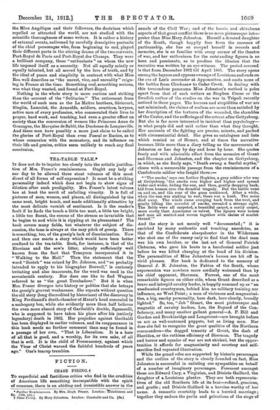TEA-TABLE TALK.*
IT does not do to inquire too closely into the artistic justifica- tion of Mrs. Fraser's reminiscences. Ought any lady of our day to be allowed three stout volumes of this most direct of all forms of self-expression ? It must be a striking personality indeed which does not begin to show signs of dilution after such prodigality. Mrs. Fraser's latest volume has at least the merit of unfailing vivacity. It is full of pictures of men, women, and places, all distinguished by the same neat, bright touch, and made additionally attractive by the most delicate varnish of sentiment. Is it the reader's fault if he finds the touch a little too neat, a little too bright, a little too fluent, the course of the stream so invariable that he begins to nod while it is rippling at its pleasantest The book covers many fields, but whatever the subject of dis- cussion, the tone is always at the easy pitch of gossip. There is something, too, of the gossip's lack of discrimination. Now and then one meets a story which would have been better confined to the tea-table. Such, for instance, is that of the Etonians and the sow's litter, already sufficiently well known from the fact that Tennyson incorporated it in " Walking to the Mail." Then the statement that the word " Scotch " was coined by Dr. Johnson, and "so probably intended to apply to his biographer Boswell," is curiously irritating and also inaccurate, for the word was used in the seventeenth century. Nor does one like to find Wagner referred to as " the great Troubadour." But it is when Mrs. Fraser diverges into history or politics that she betrays the gossip's gravest weaknesses. She repeats without question the old story (long discredited by historians) of the discovery in King Ferdinand's death-chamber of Murat's head concealed in a mahogany box, while she evidently more than half believes the even more absurd story of Garibaldi's double, Sganarelli, who is supposed to have taken his place after his (entirely legendary) death in 1862. Her prejudice against Garibaldi has been displayed in earlier volumes, and its reappearance in this book needs no further comment than may be found in a passage of her own, "That is Liberalism. It is a hate of all that is good, and a worship, for its own sake, of all that is evil. It is the child of Freemasonry, against which the Vicar of Christ warned the faithful hundreds of years ago." One's teacup trembles.










































 Previous page
Previous page